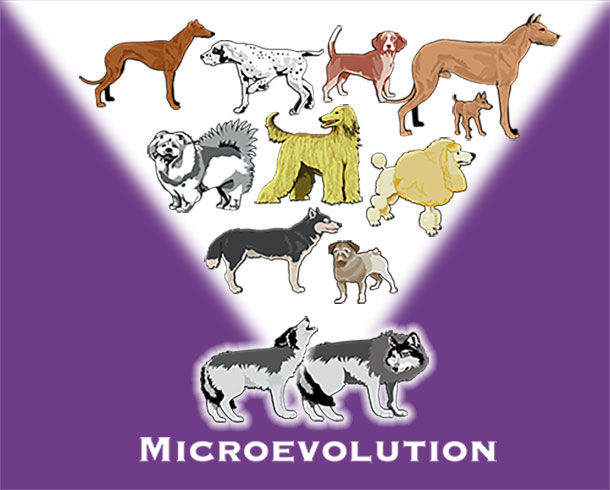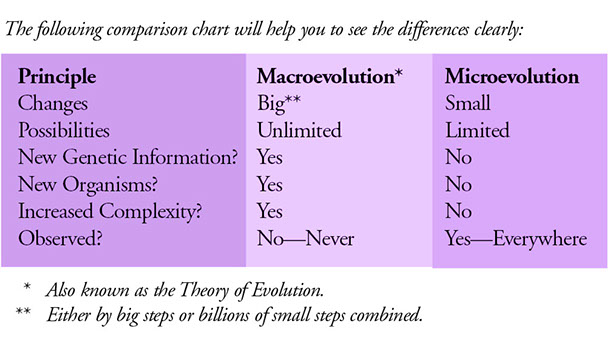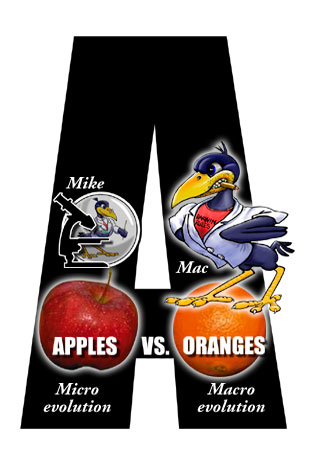
MENU

Apples vs. Oranges (Micro vs. Macro evolution)
Mike Crow and Mac Crow represent the concepts of microevolution and macroevolution and will help you remember the differences between the two. Mike Crow, being very small, can be seen only under a microscope. His size will remind you that microevolution deals with small changes. Mac Crow, on the other hand, is very large. He will remind you that macroevolution deals with big changes.
What scientists now know is that comparing Micro- and Macroevolution is a false comparison—like comparing apples and oranges because macroevolution requires new genetic information and microevolution does not provide it. So whenever we see microevolution occurring, it provides no evidence for the idea that macroevolution or Darwinian evolution ever did or ever could happen!1 And those who attempt to claim that it does, are merely using a "bait'n switch" tactic to promote the false idea that Darwinian evolution can take place.
Microevolution
“Micro” means small. Microevolution occurs when small, limited changes which do not result in new genetic information or organisms take place. A good example of microevolution is seen in the dog species. All its variety has come from possibly one or two original kinds. Relatively small changes have occurred in things like size or color, but Saint Bernards and Chihuahuas are still members of the dog species.

Microevolution never results in a different kind of organism. Plants and animals microevolve when “minor genetic modifications (mutations) or the environment activates the release of already existing latent genetic information.”2 But it’s important to know scientists have discovered that these changes are genetically limited, never allowing change past a certain point. No new genetic information is produced.3 Microevolution is seen everywhere, and it harmonizes with all known scientific principles and laws. It is also in complete harmony with what the Bible tells us. Creation scientists believe God designed the genetic code with the ability to produce interesting variety within each kind (or baramin=created kind), but not with the ability to produce a new kind.4
There’s plenty of evidence for microevolution, but this evidence cannot be used in support of the Theory of Evolution (macroevolution).
Macroevolution
“Macro” means large, and macroevolution predicts large scale changes resulting in an increase in order, complexity, and viability; ie., organisms become stronger, or faster, and better able to reproduce. It theorizes that billions of mutations (or some believe only a few key mutations, as in a theory called “punctuated equilibrium,” also known as the “hopeful monster theory”) ultimately add up to completely new and more complex kinds of plants or animals. It means that nonliving matter somehow evolved into living things and that ultimately the entire complex universe came from nothing. Macroevolution has never been observed, but it claims that naturally occurring processes have the unlimited ability to produce new genetic information. Single-celled creatures are able to change into many-celled creatures and ultimately into fish, amphibians, reptiles, birds, mammals, and man.5


Microevolution:
No new information!
Macroevolution:
Needs new information!
Comparing micro- and macroevolution is like comparing apples and oranges—meaningless!
- Davis, Percival, Dean H. Kenyon and Charles B. Thaxton, ed. Of Pandas and People. Dallas, TX: Haughton Publishing Company, 1993, p. 20.
- A. E. Wilder-Smith, The Natural Sciences Know Nothing of Evolution (Costa Mesa, CA: T.W.F.T. Publishers, 1981), p. 137.
- Roger Lewin, “Evolutionary Theory Under Fire,” Science, Vol. 210, No. 4472 (November 21, 1980), p. 883, as cited in Paul S. Taylor, The Illustrated Origins Answer Book (Mesa, Arizona: Films For Christ Association, 1989), p. 85.
- Taylor, p. 27.
- Ibid., p. 84.
Design, graphics and artwork copyright © 2016 Tim Beasley • All rights reserved.